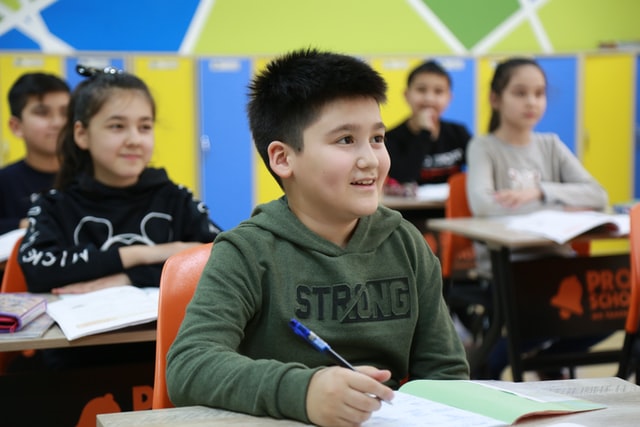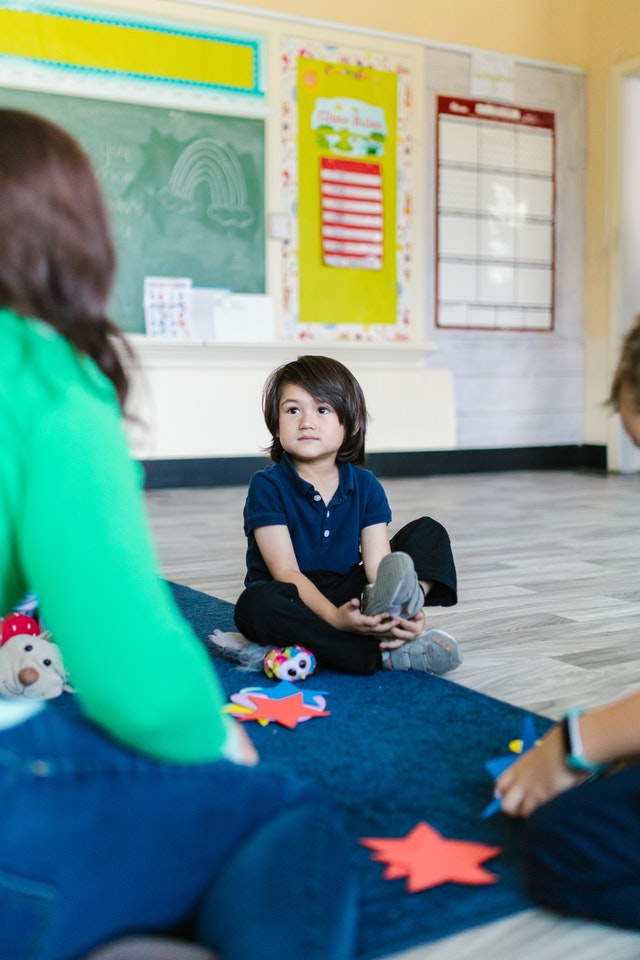The way a child communicates is half the effort of themselves and half the effort of their parents and teachers. Therefore, developing communication skills for kids is important for parents because it is an essential life skill that allows them to express themselves clearly. It also enables learning and the meaningful exchange of information with others. Having good communication skills can even boost confidence and personality growth in children.
What Are the Basic Communication Skills Every Child Should Know?
Basic communication skills for children are of two types – verbal and non-verbal.
Verbal communication refers to the usage of words, vocabulary, and involves developing children’s speaking skills. Non-verbal communication is what children start developing even before they learn to talk. It involves the usage of gestures, body language, and even silence for communicating.

How Can You Help Your Child Develop Good Communication Skills?
It’s not just about learning to talk. It’s about learning how to talk well, express thoughts and feelings clearly, and listen to others.
Here are 11 ways in which you can improve communication skills for kids and set them up for success in future –
1. Discuss Their Day

A simple ‘How was your day?’ can open Pandora’s box and encourage your kid to communicate. If they come across as someone who is reserved, you can try to nudge them by asking what they do at school, how was their playtime at school, or what they feel like doing today.
It is equally important to listen and show interest in what they are saying. You can also encourage them further by describing your day to them!
Read more: 11 Strategies to Motivate Your Child to Learn
2. Read Together

Most kids love reading story books or comic books, especially if you’d read with them. So, take out their favourite books and read together. Make it fun by adding relevant facial expressions and gestures to keep them hooked to reading. After you’re done reading, you can discuss the plot, characters, or any new words they learned. This will help develop their vocabulary along with their communication skills!
As parents, you would want to spend as much time with your kids as possible to read together. Unfortunately, with remote working coming to an end, you would have to go back to your office during the day. While this might put a dampener on your plans to read together, you can always send your kids to great preschools that will help them pick up reading. Make sure that you check out the reviews and ratings, along with physically meeting the teaching faculty at the preschool. Kids learn more around preschools especially because other kids are there.
3. Get Creative with Scrapbooks
What could be better than an art and craft activity full of colours to attract your kids? Take them stationery shopping and encourage them to start filling a scrapbook with their fond memories.
Scrapbooks are great for developing communication skills for kids and also give them something to look back at.
4. Have Practice Conversations
Practice conversations are an excellent way to get children into the habit of communicating, especially about something that makes them nervous. For example, talking to other kids at lunch or talking to new people. Make them think of what they might say and then ask them to practice it. You can give them different scenarios and ask them to communicate through different conversation topics and responses.
5. Enroll Them in a Communication Class

There’s a limitation to how much parents can do to improve children’s speaking skills. Kids need a learning environment that can motivate them to learn and perform continuously. Therefore, enrolling them in online or offline communication classes can help them learn faster and grasp better.
Your kid will also get exposed to other learners who speak in different mother tongue languages. Communicating with them in a common language like English can help your child develop empathy and better communication skills. Spoken English classes for kids would be best to improve their English vocabulary, grammar, and punctuation.
6. Teach Them Respectful Words

Vocabulary plays a big role in communicating calmly when you are angry so that you don’t end up hurting anyone’s feelings. This is why you should focus on teaching respectful alternatives for such conversations to your kids. For example, saying ‘I don’t agree with you instead of calling someone stupid.
Moreover, some phrases and terms might be considered pejorative in certain cultures, but a child’s innocence wouldn’t know that. Therefore, it becomes the parent’s responsibility to teach their children the origin of these words and how to use them appropriately when needed.
7. Introduce The Concept of Journaling
Developing one’s writing skills is also a part of improving communication skills. Moreover, some kids just feel more comfortable talking once they have thought their thoughts through.
So, introduce the concept of journaling to your kid where they can write about their day-to-day activities and feelings. This might also help your child feel more confident about communicating with others as they’ll feel more prepared.
8. Listen To Them
Children need to be heard to keep them from feeling discouraged or unloved. So, make sure you create a comfortable environment that is conducive to communicating freely. Ask them for their opinions on things, give them time to answer, and show genuine interest in what they say. Try to give your kids your undivided attention.
9. Play and Learn Together

If it’s teaching children, you’ve got to make it fun!
You can play picture storytelling with your kid wherein you give them a set of pictures that they need to arrange in a logical sequence and then narrate a story around it. You can also include watching TV and playing other games that will engage them in learning new communication skills. It can also be a way to bond with them while playing.
10. Teach Them the Importance of Body Gestures
Don’t forget to focus on your child’s non-verbal communication skills like maintaining eye contact, nodding, smiling, using hand gestures appropriately, etc. If they find it confusing, you can explain a few things to them with examples. For instance, “Mommy is crossing her hands because she is feeling angry” or “Daddy feels insulted when you roll your eyes at him.”
11. Be a good role model:
While you focus on developing your child’s communication skills, don’t ignore your own ways of communicating. Be a good role model for them as kids like to mimic the actions of their parents, and thus catch certain habits and words from them.
To conclude:
Good communication skills are not something kids are born with. They learn it on the go. So, be patient and enjoy their progress as they become communication maestros with these top communication skills!You May Also Like: How Can Children Have a Very Good Command Over the Sets in Mathematics?

